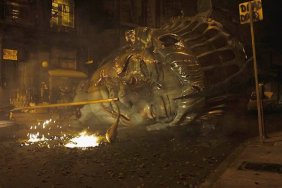I have been trying to write a proper review of 10 Cloverfield Lane for a while now, but I kept hitting a brick wall, because of these little things we call “spoilers.” Discussing a movie without ruining its twists and turns can be tricky for even the most seasoned of critics, especially since there really isn’t a universally accepted definition of a “spoiler” in the first place. A spoiler is a bit like pornography: most folks just seem to know it when they see it.
But we can all probably agree that describing the very end of just about any movie qualifies as a spoiler. That’s perfectly reasonable, but it can sometimes leave critics in a lurch. What do you do when a movie is great except for the very ending, which is so poorly handled that it actually ruins the movie that came before it?
You can’t just say “the ending sucks” without explaining yourself, because being able to explain why you responded a certain way to a motion picture is a big part of what separates critics from casual commenters. But you also can’t go into any detail without “spoiling” the movie. So there seems to be two viable options: 1) avoid talking about the ending, sacrificing your integrity and potentially over-emphasizing the good parts of the movie that you can talk about, if only because you can’t balance it out by describing any bad parts, or 2) just declare an old-fashioned SPOILER ALERT and risk pissing people off if they haven’t seen the movie yet but just can’t help themselves.

Paramount Pictures
I’ve decided that I am going with the second option, because I don’t particularly want to give 10 Cloverfield Lane a free pass out of sheer politeness. And besides, bending over backwards to preserve a spoiler only matters before audiences have a chance to see that movie. After the secret is out, everything you wrote about the movie becomes obsolete. If you avoid discussing the elephant in the room, it won’t matter what you wrote because in the days to follow, all anyone will want to talk about is that elephant. So screw it. Let’s go on the record here.
I put it to you that ending of 10 Cloverfield Lane sucks. Now let me explain why, with SPOILERS. (See? I even capitalized it. You can’t say you haven’t been warned.)

Paramount Pictures
10 Cloverfield Lane is a cleverly conceived potboiler about a young woman named Michelle (Mary Elizabeth Winstead), who escapes an unhappy marriage and takes with her a notebook of stifled dreams, specifically about designing clothes. As she flees her husband (Bradley Cooper), who seems eager to badger her into giving up her freedom, she is involved in a serious car accident and then wakes up in an underground bunker with Howard (John Goodman), a man who won’t let her leave.
Howard claims that the world outside has been obliterated, by terrorists or the Russians or possibly even Martians, and that leaving his confined conservative dwelling would kill Michelle, Howard, and Emmett (John Gallagher Jr.), a handyman who forced his way into the bomb shelter just moments after something very mysterious happened outside.
Michelle is, quite understandably, suspicious of Howard. She tries to escape, but when she looks outside she sees a woman with burns on her face, begging to come inside and dying from some sort of toxin. So Michelle abandons the concept of freedom after seeing another woman dying alone, and instead commits to staying with Howard and Emmett in a mockery of suburban bliss, complete with jigsaw puzzles and John Hughes movies and classic pop songs on the soundtrack.

Paramount Pictures
It is only after Michelle learns that Howard has been lying to her the whole time, discovering evidence that he has a history of kidnapping women to stay in his underground prison to impersonate domesticity, that she decides – for the second time in the movie – to fight back. She formulates a plan with Emmett to make a homemade hazmat suit, putting her long-neglected clothing designer skills to good use, and then eventually overpower Howard and escape.
But Howard catches wind of their little scheme, forcing Michelle to take action, and fight for her freedom, and take an allegorically significant risk: she shirks the safety of domesticity and leaves her patriarchal oppressor behind, for the sake of an uncertain and potentially dangerous future. She emerges from the bunker and, pointedly, discovers that the air is breathable. She has earned her independence through personal growth, sacrifice and self-actualization.
And then it turns out the alien invasion was real and for about ten minutes she has to fight off worm monsters and make a homemade molotov cocktail to throw at a UFO and make it explode.
The end.

Paramount Pictures
Do you see the problem there? The mystery of 10 Cloverfield Lane – i.e. what’s really going on outside of the bunker – is intriguing but it’s not the point. The film ably balances suspense and thoughtful storytelling for the majority of its running time, and concludes both stories admirably, only to fall apart in the last few minutes by suddenly placing all of its emphasis on incident instead of character. Michelle has already grown, and achieved all she needs to achieve. Making her fight monsters for an extended period when her story is already over is a novelty, sure, but it plays like a crass marketing ploy: a way to tie an otherwise minimally marketable low budget thriller as the successor to the more broadly ambitious Cloverfield.
The original Cloverfield was directed by Matt Reeves and released mysteriously in 2008, with audiences knowing very little about the film other than that it involved a giant monster attacking New York City. Ultimately there was very little else to have been curious about: Cloverfield turned out to be just a film about a giant monster attacking New York City, an on-the-nose but effective post-9/11 allegory about normal civilians deciding what’s really important to them when acted upon by an unthinkable outside force.

Paramount Pictures
10 Cloverfield Lane did not begin its life as a Cloverfield tie-in, but now that that’s what it is, we should acknowledge that there is at least a similarity in its themes. It too is about a young person who is forced to make an important choice about their priorities when faced with terrible events. But the actual alien invasion is incidental to Michelle’s story. The events of 10 Cloverfield Lane could have been incited by a terrorist attack or a scientific experiment gone awry or any number of other plot points. The point of the film is everything that leads up to its overblown ending, not the ending itself.
But by extending the action-packed conclusion for several minutes and seemingly tying it into world of Cloverfield, in which aliens are real and really are attacking us, 10 Cloverfield Lane devolves into a mere franchise tie-in when it could have easily operated instead as a significant artistic achievement in its own right. The intimate events that build to this over the top climax are reduced in significance by their juxtaposition to a larger story taking place on the global stage. And abandoning personal stakes in favor of CGI monsters and explosions alters the film’s tone so suddenly and catastrophically that the preceding dramatic storyline loses its own climactic battle with cheesy fireworks.

Paramount Pictures
By the time 10 Cloverfield Lane is over, it has become something else entirely. Mysteries are very rarely about the solution to the mystery. Like all stories, mysteries are usually about the way people change when confronted with interesting events. 10 Cloverfield Lane was all about the way a character grew until it was suddenly all about the mystery, and as a result, all of the dramatic involvement the film had been developing for the majority of its running time was ultimately sacrificed in favor of tacky world-building.
The novelty of a drastic shift in tone and the set-up for a larger tale may be distinctive, and may even be exciting the first time you see 10 Cloverfield Lane, but you can only see a movie for the first time once. Afterwards you will always have to watch this film with the knowledge of how it ends: tacky pyrotechnics. So I don’t think the thoughtful, character-oriented, truly interesting parts of 10 Cloverfield Lane will ever really work on their own a second time. Or a third. And so on.
A quality story has been sacrificed for shock value. And that is why I put it to you that the ending of 10 Cloverfield Lane sucks.
Top Photo: Paramount Pictures
William Bibbiani (everyone calls him ‘Bibbs’) is Crave’s film content editor and critic. You can hear him every week on The B-Movies Podcast and watch him on the weekly YouTube series Most Craved and What the Flick. Follow his rantings on Twitter at @WilliamBibbiani.





